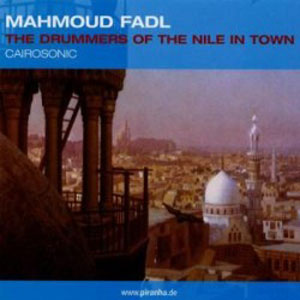 Mahmoud Fadl is a well known percussionist and advocate of the music of Nubia, that region in southern Egypt largely forgotten in the contemporary world. Raised in Assuan and Cairo, he is today based in Berlin, not coincidentally a traditional center of study on Nubian culture and history.
Mahmoud Fadl is a well known percussionist and advocate of the music of Nubia, that region in southern Egypt largely forgotten in the contemporary world. Raised in Assuan and Cairo, he is today based in Berlin, not coincidentally a traditional center of study on Nubian culture and history.
Drummers of the Nile in Town: Cairosonic is, to put it quite simply, a collection of contemporary Egyptian dance music. It is traditional dance music: this is the music you will hear at weddings and other celebrations in Cairo and other cities along the Nile. Listening gives a very good sense of what is meant by “celebration” in that part of the world: lively, tuneful, more than a little engaging, but what carries the disc is the rhythms. Intricate, direct, very sophisticated, they become part of the melody. There are tones here, highs and lows, crisp, sometimes fluttering, sometimes throbbing – the word that comes to mind is “ecstasy.”
It is close to impossible to pick out highlights from this collection: the music flows from cut to cut, and most are brief, two minutes or less (twenty-three songs tucked into fifty-six minutes). There are traditional tunes included, but most are songs by Fadl, Magdi Berbish, or Hasaballah (of whom more later), also performing on the disc. This music does, however, carry the weight of tradition – it is not westernized pop with the flavor of the Middle East, on the order of Bally Sagoo, but, one feels (and is justified, given Fadl’s emphasis on Nubian culture and traditions) that what is offered is an outgrowth of what has been part of Egyptian culture for generations.
Fadl’s liner notes reinforce this feeling. Breezy, articulate, marked by an infectious lightheartedness, Fadl relates the search for Hasaballah, a brass band that he once witnessed as part of someone’s moving day (another Egyptian tradition — one hires a band to celebrate newlyweds moving into a new home). The search invokes memories of Mohammed ‘Ali Street, the traditional hangout of musicians looking for work in the days when few had phones, much less agents. Hasballah stuck in Fadl’s mind because, not only were they good, brass bands in Egypt are exceedingly rare. The search led to the assembly of the musicians heard on this album, and finally, successfully, Hasaballah, six of whom walked into the studio – from Mohammed ‘Ali Street, where they had gotten word of the project.
This is an exceptionally engaging collection by a master drummer and a group of amazing musicians. According to reports, Fadl’s United Nubians, called a “Tribal House” project, has taken the Berlin Club scene by storm. I can believe that.
(Piranha Musik, 2003)
